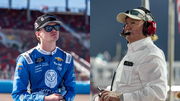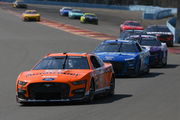
USA Today via Reuters
Mar 10, 2024; Avondale, Arizona, USA; NASCAR Cup Series driver Ty Gibbs (54) leads the field for the restart of the Shriners Children’s 500 at Phoenix Raceway. Mandatory Credit: Gary A. Vasquez-USA TODAY Sports

USA Today via Reuters
Mar 10, 2024; Avondale, Arizona, USA; NASCAR Cup Series driver Ty Gibbs (54) leads the field for the restart of the Shriners Children’s 500 at Phoenix Raceway. Mandatory Credit: Gary A. Vasquez-USA TODAY Sports
Money can buy a lot of things. In NASCAR, for instance, it can buy speed, partnerships, and more advertising time. But, sadly that’s not all. Currently, money can help you get a seat with a NASCAR team, too, especially if it’s a smaller one. But, as you might have guessed, this is problematic for the simple reason that with this kind of system, the rider with more money might sometimes get a seat instead of the driver with more talent.
Now, NASCAR is criticized for a number of things. But this is something that is upsetting for fans, analysts, and drivers, to say the least.
ADVERTISEMENT
Article continues below this ad
The pay-to-play system – criticisms explained
Almost a day ago, college football analyst Brad Crawford shared on X, “Brent Venables has a buyout of $44.8M if Oklahoma fired him today. If the Sooners fire him this next year, it’s $35M. No better financial windfall in the country than landing an elite CFB gig, regardless of the outcome.”
However, Podcaster Brett Griffin retweeted it, saying, “And we have NASCAR drivers running the Daytona 500 and making zero. I didn’t stutter. The 2008 guys made more than the 2024 guys will make as a whole. Insane.” Griffin here is talking about the finishing positions. As per the rules, if drivers don’t finish inside of specific positions, the payout might be zero. Wonder why some drivers feel like their life depends on (or don’t) during crunch time? Daytona is the most prestigious racing event in NASCAR. But, when drivers are given a ride because they have money and not immense talent, discussions about the same are bound to happen. It’s important to note that the trend has been seen since 2019, and drivers whose contracts are about to expire are not the only ones at the brunt.
One of the examples of a driver with money having a ride might be Paul Menard. Menard’s record is average at best, but he always had his family business to support his ambitions. But, some teams have dropped drivers even when the performance cut the mark, sometimes even when the contract they had with the drivers was long-term. And why? Because the new driver could bring the moolah in.
And we have NASCAR drivers running the Daytona 500 and making zero. I didn’t stutter.
2008 guys made more than 2024 guys will make as a whole. Insane. https://t.co/5cpOCtr565
— Brett Griffin (@SpotterBrett) December 27, 2024
Daniel Suarez lost his position with Stewart-Haas Racing in 2019 because he couldn’t secure full sponsorship by the end of the season. His contract included a team option that allowed SHR to opt out, a decision that didn’t sit well with fans and reflects a growing trend in the sport. The same year, Chase Briscoe was also about to lose his seat for 202o and was asked by SHR to get funding or hear the music.
Smaller teams often form alliances with larger teams for survival, gaining access to valuable resources but also becoming reliant on the parent team’s decisions. A notable example is Matt DiBenedetto leaving Leavine Family Racing after Joe Gibbs Racing pushed for Christopher Bell to fill the seat due to resource needs. It’s worth noting here that this trend isn’t new, though. In the past, teams like Roush Fenway Racing, SHR, and RCR have made similar arrangements to support their drivers.
But what happens when an average driver drives badly and makes a good driver lose his spot within the payout ranking? We all heard what Griffin wrote. NASCAR driver salaries vary widely based on factors such as performance, experience, sponsorships, and team affiliation. Charter teams, which are guaranteed spots in every race, typically earn more than Non-charter teams. On average, a NASCAR driver makes about $112,038 annually, while development drivers earn around $50,000. Only a select few earn significant income from NASCAR, as prize money for race winners can range from $1.5 million to $2 million, with higher placements resulting in greater earnings.
ADVERTISEMENT
Article continues below this ad
Trending
But how did it come to this?
Finding sponsors for NASCAR teams has become increasingly challenging in recent years. When a driver can offer financial support, whether through sponsorship deals or direct payments, teams face a difficult decision that impacts both job security and competitiveness. Not long ago, NASCAR was experiencing a surge in popularity, and sponsorships were abundant. This allowed teams to select talented drivers who could secure funding, enabling young drivers to showcase their skills without the burden of financial pressure. Many of today’s champions, including Jimmie Johnson and Jeff Gordon, emerged during a time when racing was more affordable.
However, as costs escalated and sponsor interest waned, teams found themselves in a precarious position. They must choose between hiring a gifted but underfunded young driver or opting for someone who can bring financial backing to ensure competitiveness on the track. This dilemma is particularly tough, especially since it often clashes with fan expectations. As the financial demands of racing continue to rise, this trend is likely to persist. Teams are forced to explore options that will keep them afloat while remaining competitive, presenting a significant challenge for NASCAR as a whole. Although this practice is unpopular with fans, it may be one of the few viable paths available to teams right now.
ADVERTISEMENT
Article continues below this ad
To address these issues, some experts say that NASCAR might want to consider implementing cost-cutting measures and promoting financial equity among teams.
What do you think is the solution to NASCAR’s situation?
ADVERTISEMENT
ADVERTISEMENT
ADVERTISEMENT
ADVERTISEMENT






